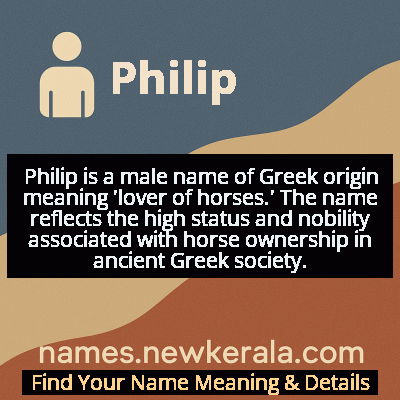Philip Name Meaning & Details
Origin, Popularity, Numerology Analysis & Name Meaning of Philip
Discover the origin, meaning, and cultural significance of the name PHILIP. Delve into its historical roots and explore the lasting impact it has had on communities and traditions.
Name
Philip
Gender
Male
Origin
Greek
Lucky Number
7
Meaning of the Name - Philip
Philip is a male name of Greek origin meaning 'lover of horses.' The name reflects the high status and nobility associated with horse ownership in ancient Greek society.
Philip - Complete Numerology Analysis
Your Numerology Number
Based on Pythagorean Numerology System
Ruling Planet
Neptune (Ketu)
Positive Nature
Intuitive, analytical, spiritual, and inquisitive.
Negative Traits
Secretive, reserved, aloof, and can be overly critical.
Lucky Colours
Green, yellow.
Lucky Days
Monday.
Lucky Stones
Cat’s eye, moonstone.
Harmony Numbers
1, 5, 6.
Best Suited Professions
Scientists, researchers, spiritual leaders, detectives.
What People Like About You
Depth of knowledge, analytical skills, spirituality.
Famous People Named Philip
Philip II of Macedon
King and Military Leader
Unified ancient Macedonia and laid foundations for his son Alexander the Great's empire
Prince Philip, Duke of Edinburgh
Royal Consort
Longest-serving royal consort in British history and founder of Duke of Edinburgh's Award
Philip Seymour Hoffman
Actor
Academy Award-winning actor known for powerful performances in films like 'Capote' and 'The Master'
Philip K. Dick
Science Fiction Author
Influential writer whose works inspired films like 'Blade Runner' and 'Minority Report'
Name Variations & International Equivalents
Click on blue names to explore their detailed meanings. Gray names with will be available soon.
Cultural & Historical Significance
In Christian tradition, Saint Philip the Apostle spread the name's religious significance, while in modern times, the name has been carried by influential figures across diverse fields from science to entertainment. The name's enduring appeal across centuries and cultures reflects its classical roots while adapting to contemporary contexts, maintaining its prestige while becoming accessible to broader populations. This cultural journey from ancient Greek aristocracy to global usage demonstrates the name's remarkable adaptability and lasting resonance.
Extended Personality Analysis
Individuals named Philip are often perceived as possessing a balanced combination of classical virtues and modern adaptability. They typically exhibit strong leadership qualities, intellectual curiosity, and a practical approach to problem-solving, reflecting the name's royal heritage and strategic associations. Many Philips demonstrate reliability and steadfastness in their personal and professional relationships, often serving as stabilizing forces in their communities or organizations.
The equestrian meaning of the name frequently translates metaphorically into personality characteristics such as grace under pressure, endurance, and the ability to navigate challenging situations with poise. Philips are often described as having a quiet confidence rather than overt arrogance, with many displaying diplomatic skills and the ability to build consensus. While individual personalities vary greatly, the name's historical weight often inspires a sense of responsibility and tradition, balanced by the flexibility needed to succeed in contemporary environments.
Modern Usage & Popularity
In contemporary times, Philip maintains steady popularity as a classic, distinguished name that bridges traditional and modern sensibilities. While it peaked in popularity during the mid-20th century, particularly in English-speaking countries following Prince Philip's marriage to Queen Elizabeth II, it has since settled into a comfortable position as a reliable classic rather than a trendy choice. Current usage trends show Philip being favored by parents seeking a name with historical depth and international recognition that doesn't feel dated or overly common. The name enjoys particular strength in professional and academic circles, where its classical roots and royal associations convey stability and intelligence. Modern diminutives like 'Phil' and 'Pip' provide casual alternatives, while the full name retains its formal dignity.
Symbolic & Spiritual Meanings
Symbolically, Philip represents nobility, strength, and graceful leadership, drawing from its equestrian roots where horses symbolized power, freedom, and status in ancient societies. The name carries connotations of journey and progress, reflecting how horses historically enabled exploration and connection between cultures. In metaphorical terms, Philip suggests someone who can 'tame' challenging situations with skill and patience, much as a skilled horseman controls a powerful animal. The name also symbolizes bridging traditions—connecting ancient Greek civilization with modern Western culture, and aristocratic heritage with contemporary democratic values. This symbolic richness makes Philip a name that suggests both rootedness in tradition and the capacity for forward movement and adaptation.

